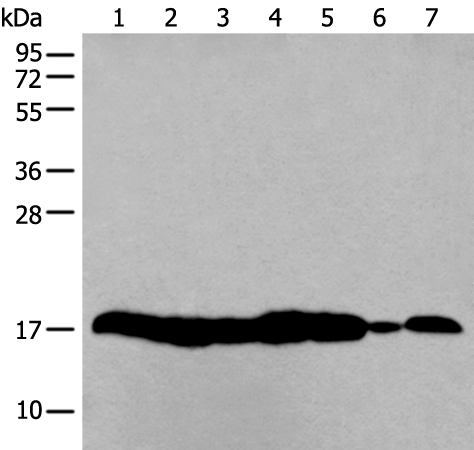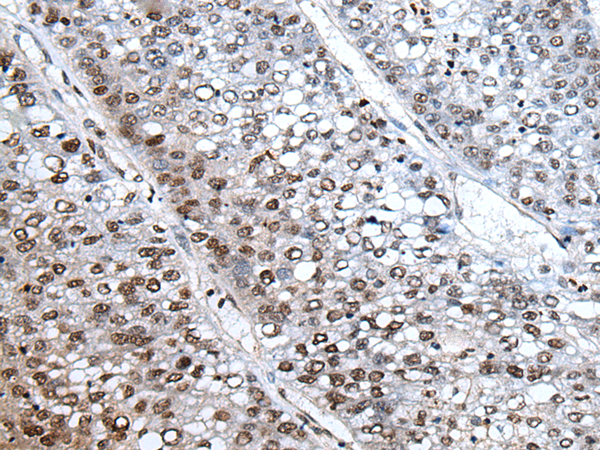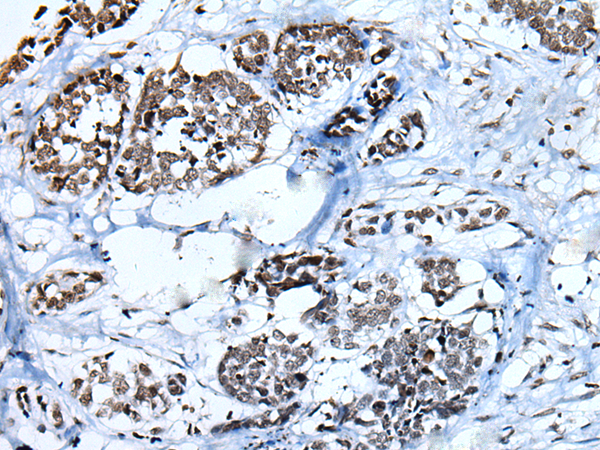


| WB | 咨询技术 | Human,Mouse,Rat |
| IF | 咨询技术 | Human,Mouse,Rat |
| IHC | 1/25-1/100 | Human,Mouse,Rat |
| ICC | 技术咨询 | Human,Mouse,Rat |
| FCM | 咨询技术 | Human,Mouse,Rat |
| Elisa | 1/5000-1/10000 | Human,Mouse,Rat |
| Aliases | H3/A; H3FA; HIST1H3A |
| WB Predicted band size | 15 kDa |
| Host/Isotype | Rabbit IgG |
| Antibody Type | Primary antibody |
| Storage | Store at 4°C short term. Aliquot and store at -20°C long term. Avoid freeze/thaw cycles. |
| Species Reactivity | Human, Mouse |
| Immunogen | Synthetic peptide of human H3C1 |
| Formulation | Purified antibody in PBS with 0.05% sodium azide and 50% glycerol. |
+ +
以下是关于H3C1抗体的模拟参考文献示例(仅供参考,建议通过学术数据库获取真实文献):
1. **文献名称**:*Histone H3.1 Antibody Characterization in Epigenetic Studies*
**作者**:Li, X. et al.
**摘要**:该研究验证了H3C1抗体在染色质免疫沉淀(ChIP)中的特异性,证明其能有效区分H3.1与其他组蛋白变体(如H3.3),并应用于癌症细胞系中核小体动态分析。
2. **文献名称**:*Role of H3C1 in Cellular Differentiation Revealed by Antibody-Based Profiling*
**作者**:Smith, J. & Gonzalez, R.
**摘要**:通过H3C1抗体的免疫荧光和Western blot实验,揭示了H3.1在干细胞分化过程中染色质重塑的关键作用,及其与多能性基因沉默的关联。
3. **文献名称**:*Development of a Monoclonal Antibody Targeting Human H3C1 for Diagnostic Applications*
**作者**:Wang, Y. et al.
**摘要**:报道了一种新型H3C1单克隆抗体的开发,验证其在高通量测序和临床样本中的稳定性,提示其作为结直肠癌表观遗传标志物的潜力。
4. **文献名称**:*Cross-Reactivity Analysis of Commercial H3C1 Antibodies in Model Organisms*
**作者**:Kumar, S. et al.
**摘要**:系统性评估了市售H3C1抗体在小鼠、斑马鱼等模式生物中的交叉反应性,发现部分抗体存在非特异性结合,为跨物种研究提供筛选依据。
---
**说明**:以上内容为模拟生成,实际文献需通过PubMed/Google Scholar以“H3C1 antibody”或“histone H3.1 antibody”等关键词检索。若研究H3C1的翻译后修饰(如甲基化),建议细化关键词(如“H3K27me3 antibody”)。
The H3C1 antibody targets histone H3.1. a core component of nucleosomes that package eukaryotic DNA into chromatin. Histone H3 exists in multiple variants, with H3.1 (encoded by genes like *H3C1* in humans) being a replication-dependent subtype predominantly expressed during the S phase of the cell cycle. It plays a critical role in maintaining chromatin structure and regulating gene expression through post-translational modifications (e.g., acetylation, methylation) that influence epigenetic signaling.
H3C1 antibodies are widely used in epigenetics research to investigate histone modification patterns, chromatin dynamics, and their implications in diseases like cancer. These antibodies enable techniques such as chromatin immunoprecipitation (ChIP), immunofluorescence, and Western blotting to study H3.1-specific interactions or modifications. Specificity is crucial, as H3.1 differs subtly from other variants (e.g., H3.3) in amino acid sequence and function. Validation often involves knockdown models or peptide competition assays to confirm minimal cross-reactivity.
Commercial H3C1 antibodies are typically raised in rabbits or mice using synthetic peptides corresponding to conserved regions of H3.1. Researchers rely on these tools to explore cell cycle-dependent chromatin remodeling, DNA repair mechanisms, and aberrant histone modification profiles in pathological states. Proper controls are essential to distinguish H3.1 from other histone isoforms in experimental workflows.
×